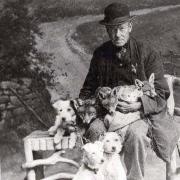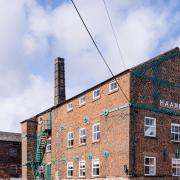David Marley speaks to two of the local firm’s long-serving female staff and discovers the tale of the pioneering women who kept it on track

‘It never crossed my mind to work anywhere else other than Denby Pottery,’ recalls the firm’s former company secretary, octogenarian Eileen White. ‘My working life began and ended there, just like so many other women from all walks of life before me; all helping to make this company great.’ Despite the pottery industry traditionally being regarded as a male bastion, it appears that Denby Pottery has managed to buck the trend throughout its history – allowing a succession of highly-successful female protagonists to guide it to great prosperity and expansion. However until now, many of their stories have gone untold.
‘The role of women in pottery-making at Denby stretches back to the company’s creation over 200 years ago – but very few people will have heard about our pioneering great ladies who transformed the fortunes of the company, helping to make it the household name we know today,’ says Linda Salt, Denby’s communications manager, who like Eileen, has devoted her entire working life of 40 years, to the same pottery business. ‘At key critical points in the history of Denby – during moments of national crisis, war, economic depression and management buyouts – women have excelled here. From the company’s great matriarch Sarah Elizabeth Bourne who managed the firm at the end of Queen Victoria’s reign through to Eileen White, whose meteoric rise from an office junior in the firm to taking a seat in the boardroom, shows how women have always played an important role here – and continue to do so today.’
‘When the company needed office staff, my headmaster recommended me,’ smiles Eileen as she begins to absorb the decorative changes in the boardroom where we are sitting – a place she retired from in 1988, after 44 years of service with the company. ‘I was a very curious child and wanted to find my place in the world.’ Despite the possibility of working for a solicitor in Ripley, she followed the recommendation of her headteacher and travelled the short distance from Kilburn to Denby for an interview. It was 1944 and Britain was still at war with Germany and with so many men away fighting this presented an early opportunity for Eileen to join the workforce.
‘These were difficult times but I remembered my great-grandfather had worked in service as a butler to Sir Alfred Haslam of Derby and I was keen to devote myself to the service of a good local company and do something positive. The interview went well, I was offered a job and Denby quickly became my life – nothing else mattered and I fell in love with the place, serving my entire career here. In the very early days I even came in on weekends to feed the canteen cat!’

At this point Eileen starts to delve deep inside a shopping bag she has brought with her, containing great tracts of historical papers and private photographs of Denby – all gathered over the decades she spent at the firm. She is keen to share them with Linda, the company’s current museum curator and archivist (a post held by Eileen many years earlier).
‘Have you got this photograph of Sarah Elizabeth Bourne and these pottery marketing cards?’ she affectionately asks Linda, in the diligent manner of a schoolboy swapping football cards in a playground. Preserving history is very important to Eileen – years earlier in 1987, during a company takeover, she had arranged for key archives to be taken away for safekeeping.
‘I started as an office junior and rose through the ranks to the post of company secretary, sitting on the board of directors. It was a time when anything was possible but it took a lot of personal sacrifices and hard work to get there,’ remembers Eileen. In 1946 the managing director of Denby, Norman Wood, encouraged Eileen to enroll at Reede’s Commerical College in Derby for a six-month secretarial course on day release. This was the beginning of her ‘getting an education’ which was to see her obtain additional qualifications at colleges in Derby and Ilkeston.
‘Mr Wood also thought it would be very useful if I could drive, so they taught me to do so. I passed my test in March 1947 and added the role of “driver” to my many company duties,’ she laughs. ‘I spent lots of time transporting buyers and designers to and from Derby station in the 4.2 Jaguar!’ During a bus strike in the 1950s Eileen also drove colleagues to and from work and she was sometimes called upon to take Norman Wood’s son to school in Cheltenham and collect her boss from Heathrow Airport.

‘It wasn’t like coming to work, it was more like coming to a pleasure place. We were making beautiful things, which were to eventually live in people’s homes. We never produced anything we were ashamed of,’ she recalls with pride. By the 1950s the factory was beginning the process of mechanisation. ‘When I first started here very little had been done to it since the Victorian era. We were still using a Shire horse and cart to transport the clay – the work was clean but very dusty and heavy. Making the clay into pots (before it was put into the kiln) at this time was undertaken mainly by men known as throwers.’
Traditionally women fulfilled two key functions at the pottery – in the early days preparing clay into clay balls for the throwers to turn into pots and latterly the decoration of the glazed products. ‘Each thrower had a girl standing behind him. She was known as a “ball-maker” and her role was to cut the clay from a big slab; weigh it (which had to be the same each time); and then push it together into a ball to be put on the thrower’s wheel,’ says Eileen. ‘These women could be turning out between 300 and 1,000 balls of clay per day depending on the size of the product. Until the late 1970s we were also hand-decorating our products – there were no transfers at this point. The firm employed over 70 girls in the decorating room – men entered this place at their peril!’
Eileen has always been a keen photographer – and during her working career the company was keen to use her photographic skills. On one occasion she made a 16mm cine film, which was used for advertising and educational purposes. Eileen remembers: ‘I went down into the clay mine to obtain some shots; being lowered down into the mine in a tub used for hauling clay!’
With the encouragement of Norman Wood, Eileen started to acquire many early pieces of Denby pottery to be used to promote the work of the company. She used these pieces to set up the small museum at the Denby Visitor Centre. ‘We first started tours at the site in 1952. Morley Women’s Institute was the first group to visit us and from this we soon had thousands coming to see our factory. We had very good, happy times here,’ remembers Eileen.

‘Eileen was totally devoted to working at Denby – it was quite a wrench for her to leave,’ recalls Linda Salt. ‘She is a very special person, almost like a second mum to me. She interviewed me for my first job here and had great faith in my abilities. She is an inspiration to those of us who worked with her.’
Linda began her career at Denby in 1973 as a secretary in the managing director’s office and in later years came up with the imaginative idea of creating a public relations arm of the company. Despite not having any formal marketing qualifications, Linda quickly set to the task of creating a communications division within the firm and since then she has generated thousands of column inches promoting the work of the company in newspapers and magazines. She has also successfully placed hundreds of Denby’s branded products on numerous popular television programmes, such as Emmerdale, Hollyoaks, Jonathan Creek, Sherlock and popular cookery shows.
In typical modest style, Linda quickly diverts attention away from her impressive media achievements by presenting a black and white photograph of a Victorian woman. ‘This is Sarah Elizabeth Bourne. For almost 30 years between 1869 and 1898 she was the sole proprietor of the company. During her time at Denby she witnessed many changes both in business and society in general – she was responsible for the production of the first coloured glazes in 1884, which took Denby in a new, exciting direction.’ Mottled blue and brown were the first colour glazes produced at Denby and were widely praised in the Pottery Gazette of the time. This “Majolica” glaze as it was known led to the production of numerous decorative pieces including pig- and elephant-shaped moneyboxes, which carried the child’s name and a rhyme to encourage them to save money.
This money-saving ethos was also put into practice in the workplace. Sarah Elizabeth encouraged her 400 workers to put a small portion of their wages aside each week and gave them interest of perhaps a few coppers a week. ‘In a way she was responsible for creating the first employees’ savings scheme,’ laughs Eileen. ‘She may have been small in stature but she was a remarkable women. She was kind and thoughtful and commanded the respect of her staff and business associates. It is ironic that only her male staff at the factory could vote and she couldn’t, something that did not fully change until 30 years after she died.’
Sarah Elizabeth Bourne transformed the fortunes of Denby, making the most of technological advances of the time. ‘Denby became one of the biggest producers of telegraphic insulators following the invention of the telephone in 1876, with Sarah Elizabeth gaining many new orders to meet the demand. During her leadership she transformed the business from one that simply made jars and bottles for commercial purposes into one that was making cutting-edge products and decorative items for the home. By the time of her death she was a very rich woman and had brought great prosperity to Denby,’ says Linda.
Sadly, Sarah Elizabeth did not have any children, so the pottery was left jointly to Joseph Bourne-Wheeler (her husband’s nephew) and John Topham (her nephew). Eventually Mr Topham withdrew from the business and Joseph Bourne-Wheeler become the sole owner. He moved with his wife, Florence Bourne Wheeler, to live at Netherlea in Holbrook, the country house built by Sarah Elizabeth Bourne. Mrs Bourne Wheeler played an active role in the business, taking on the role of company secretary from 1916. ‘Florence had a strong sense of service to the community which led her to undertake many voluntary roles, for example with the Derbyshire County Nursing Association and the Derbyshire branch of the Soldiers and Sailors Families Association. She was also involved in the National Council for Women,’ says Linda. Florence was also the first woman to be elected to Derbyshire County Council, representing the Smalley district. When Joseph Bourne Wheeler died in 1942 she took on the role of chairman of the company and she was awarded the MBE for her charitable work.
Another remarkable woman in the life of Denby was Barbara Wood. Following the death of Mrs Bourne Wheeler, she became the company secretary. ‘Barbara was a very strong support to her husband, Norman, and helped build up the company’s reputation for high-quality design during the 1940s and 1950s,’ remembers Eileen. ‘She spent a short period on the shop floor improving her manufacturing knowledge before putting it into practice in the boardroom. She also established a new staff canteen – much appreciated by employees in the days of food rationing after the war.’ She was also responsible for the introduction of a range of flower vases and containers ‘sponsored’ by the famous educator, florist and author Constance Spry.
The future of Denby remains as positive now as it was in Sarah Elizabeth Bourne’s era, with new young women emerging in the ranks of the company. ‘We have some wonderful young people taking up key roles in the firm – and that is very exciting! Even after 40 years service I feel great satisfaction coming to work at Denby. This is a place that is never out of your blood; it is somewhere you are proud of and it is an important part of your life. Every day I come to work I feel as though I am walking in the footsteps of the many great women who have worked here before me,’ Linda proudly concludes.
Denby Pottery
Denby Pottery was established in 1809 after a fine seam of clay had been uncovered three years earlier during the construction of a road between Derby and Alfreton. William Bourne, who owned a pottery nearby at Belper, recognised the potential of the clay seam at Denby and established his son, Joseph in business on the site of the clay. Joseph soon created an international reputation for quality stoneware bottles and jars to hold commodities such as medicines, preserves, inks and mineral water. The firm kept the name Joseph Bourne & Sons until 1976.
The Bourne family became well known as Methodists and they built chapels at Street Lane, Denby Village and Belper. The Denby firm has always played an important community role, especially during times of conflict and upheaval. Twelve members of staff fought and died in World War I.
Substantial investment has been made at Denby in the last decade. Today the firm produces tableware which evolves to suit contemporary lifestyles and is as stylish and durable as its founders intended. Recently it has acquired pottery businesses such as Burleigh in Staffordshire. www.denby.co.uk



























